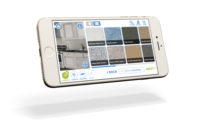To learn about Joey Marcella, co-owner and president of Mario & Son, you have to learn a bit about his father. “He was a tile setter ever since he was about 16 years old,” said Marcella. “He taught us boys the tile trade. I never really had a summer vacation since I was in about seventh grade. We would always be helping dad with his tile install and things like that. I was a professional drummer early in my career before I got into stone and being a tile setter and learning those trades early on was a good thing for me because I was playing clubs at night and during the day helping dad set tile. I didn’t particularly enjoy that but it paid the bills. Early in the 90s, we were doing a lot of homes where they typically had a fireplace that had 12 x 12 marble tiles going around the surround. With those we would have to figure out how we were finishing the edges. We didn’t know anything about stone fabrication. We learned that we could sand those edges and make them shiny and that interest me a lot. Dad was the same way and that was what kind of launched us into stone fabrication.”
GETTING A FABRICATION MACHINE INSTALLED DURING COVID-19
Mario & Son had three new pieces of machinery ordered during the pandemic, which provided a unique set of challenges for Marcella. “This is what really defined our COVID hell,” Marcella said. “When the governor shuts you down and countries put on travel bans, it can really put the hurt on your plans. Which is what happened. We had GMM, Breton, Commondulli and Water Treatment technologies all affected by it. Commundulli was able to sneak in right before COVID hit, but their edging machine is a thirsty machine, we needed upgrades to our water system in order to accommodate it. Water Treatment was handling it for us but they had to be held off for several months because of flight restrictions and their own lockdowns. During that time we had to play musical machines, we could only run certain machines if other machines were not running because of water pressure.
“Breton was able to get our new Combicut up and running,” Marcella went onto say. “but our Governor chased the tech away before we could start training. So, it was two months before he could return. We are experienced with Breton machinery, so we could kind of operate it but we really needed that additional training. GMM was really the one that was hardest hit. We purchased their new Zetta, it’s the largest 5-axis saw they make. It’s a beast of a machine, the head goes all the way up to the rafters and our shop is not small by any means. GMM typically sends a guy from their factory in Italy to set it up as opposed to one of their field techs. This arrived right at the start of COVID and the container got held up in the port of Seattle for about a month because they have their own lockdown issues there. When it did arrive, it sat in our shop for four months because of the Italian travel ban. We were already into this thing for five months at this point and we had projects booked on this machine. Luckily they were all church projects and all the churches were shut down so they were not complaining but eventually Taf Wharton from GMM came down from Charlotte to set it up. It was a bit out of his wheelhouse and he was stressed out but he did a great job. GMM has been an outstanding partner through all of this.”
CHANGES TO A BUSINESS FROM COVID
When it all started, Mario & Son was shut down like most people.
“We boarder two different states here, Washing and Idaho,” said Marcella. “Washington is very strict here, lots of regulation. Whereas Idaho is like, ‘What’s COVID?’ At first we were deemed essential in Idaho. So we were still balancing working with a reduced staff to accommodate that. My brother, who is my partner since my dad retired, he runs the numbers side of things here. He had to navigate all the government regulations and applications for all the PPE and that seemed to change hourly at first, so he had his hands full with that. Now it’s just the new COVID day-to-day reality, masks, social distancing, enhanced cleaning, appointments. We did have a few cases of COVID down here, that didn’t really blow through our company, those cases were basically positive tests with mild to no symptoms. Basically just exposure issues that require quarantining.”








